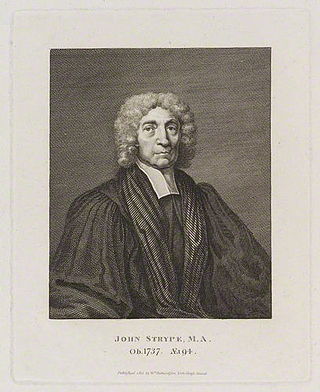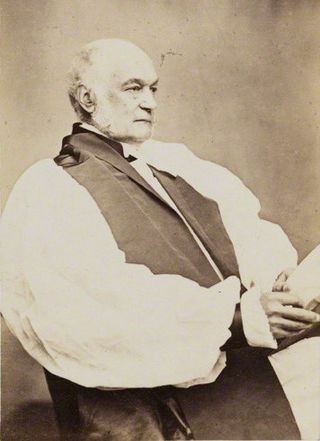Life
Squire graduated B.A. at Balliol College in 1560, and became a Fellow that year, graduating M.A. in 1564. [4] He became vicar of Cumnor in 1568, and accumulated other preferments, being canon of St Paul's Cathedral in 1577. [5]
Squire's suspicions of Robert Persons were instrumental in forcing Persons, who was Dean of Balliol College, to resign his fellowship in 1574. They had clashed when Persons was Senior Bursar in 1572–73. Squire had an ally among the Fellows in Christopher Bagshaw. [6]
Squire himself had a reputation for dealings with the supernatural. It was alleged against him by Persons that he sold familiar spirits, in the form of a fly, to gamblers; or, in the term "dycing flies", the word fly was then a synonym for familiar. [7] [8] The charge came close to losing Squire his post as Master. [9] Richard Harvey, in defending his own practice of astrology, mentioned Squire among other academics as sympathetic to it. [10] According to Balliofergus he was "a great Mathematician". [11]
Squire embezzled a legacy given to the college. [12] Around 1580 he was paid off by the Jesuit George Gilbert to turn a blind eye to the development of a Catholic association of young men in the area (Farringdon Without) of Chancery Lane or Fetter Lane. [13] In 1588, the year of the Spanish Armada, and also his death, he was given custody of a leading recusant, Walter Fowler. [14]
Family
Squire married a daughter of John Aylmer, the bishop of London to whom he was personal chaplain, by 1587. [15] [16] Their son, John, was a Cambridge graduate, and became vicar of St Leonard's, Shoreditch. [17] [18]
John Strype relates that Squire preached his own wedding sermon, that he was unfaithful to his wife, and that Squire fabricated an affair she was having. Finding out about this, his father-in-law the bishop "cudgelled" him. Further, he ran up debts, and his estate was put into administration. John Squire was brought up by Theophilus Aylmer, son of the bishop. [19]

John Aylmer was an English bishop, constitutionalist and a Greek scholar.

John Strype was an English clergyman, historian and biographer from London. He became a merchant when settling in Petticoat Lane. In his twenties, he became perpetual curate of Theydon Bois, Essex and later became curate of Leyton; this allowed him direct correspondence with several highly notable ecclesiastical figures of his time. He wrote extensively in his later years.

Tobias Matthew, was an Anglican bishop who was President of St John's College, Oxford, from 1572 to 1576, before being appointed Vice-Chancellor of Oxford University from 1579 to 1583, and Matthew would then become Dean of Durham from 1583 to 1595. All three positions, plus others, were appointed to Matthew by Elizabeth I. Eventually, he was appointed Archbishop of York in 1606 by Elizabeth's successor, James I.

George Moberly was an English cleric who was headmaster of Winchester College, and then served as Bishop of Salisbury from 1869 until his death.

George Cotes was an English academic and Catholic Bishop of Chester during the English Reformation.
John Bullingham was the Bishop of Gloucester in the Church of England from 1581.
George Abbotts or Abbot (1602–1645) was an English politician who sat in the House of Commons between 1640 and 1645.
Sir Edward Spencer was an English landowner, lawyer, knight, nobleman, and politician who sat in the House of Commons at various times between 1621 and 1648.
Francis Staresmore was an English politician who sat in the House of Commons in 1626.
The Venerable John Spry, BD of Lincoln College, Oxford was Archdeacon of Berkshire from his collation on 2 January 1747 until his death on 21 October 1763.
Thomas Singleton was an English clergyman and academic.
William Johnson, D.D. was an Anglican priest.
Simon Smith was an Anglican priest in the 16th century.
Richard Sparcheford was an English priest in the first half of the 16th century.
Miles Spencer was an English priest and academic in the first half of the 16th century.
Thomas Spencer D.D. was an English Anglican priest in the 16th century.
Thomas Sprat was an English Anglican priest.
Thomas Staller was an English Anglican priest.
John Standish was an English Anglican priest in the 16th century.
Thomas Stanoe was a Welsh Anglican priest in the late 17th and early 18th centuries.
This page is based on this
Wikipedia article Text is available under the
CC BY-SA 4.0 license; additional terms may apply.
Images, videos and audio are available under their respective licenses.





